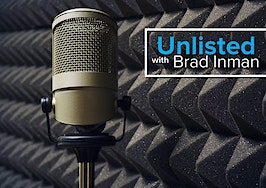- Brokers are asking, "What are you doing to help me grow my business."
- Portals are here and will not go away, but brokers must also have their own offerings and identity.
- We are seeing a shift back to the broker brand and broker site with hyperlocal content.

Sue Yannaccone
A graduate of Clemson University, Sue Yannaccone is the new president and CEO of ERA Real Estate.
With deep operational experience across many real estate companies and brands, her appointment doubled the number of women in the senior-most executives positions of Realogy Franchise Services, joining Better Homes & Gardens Real Estate CEO Sherry Chris in the top-dog suite of the realty giant.
Brad Inman: Welcome, Inman news readers, to the Unlisted podcast, I’m Brad Inman. Today, I’ve got with me the new CEO of ERA Real Estate, Sue Yannaccone. Welcome, Sue.
Sue Yannaccone: Thanks, Brad, happy to be here.
Now that name — did I pronounce it right? Are you Italian? What is that background there?
You did — I am Italian by marriage, I guess. My prior name was Daniel. I guess I really love my husband!
Let’s talk about this appointment by Realogy to put you in the CEO seat. This doubled the number of women, I think, in seniormost executive positions at Realogy Franchise Services. Have you shattered the glass ceiling over there, what’s going on? It sounds like good news for Realogy and good news for women.
Brad, I think it is. It’s great news for Realogy, it’s great news for women. You mentioned Sherry, and I would say that Sherry and others who came before me did a great job of paving the path for the women.
I’m actually the second CEO of ERA that’s a woman prior to Charlie Young. Brenda Casserly lead ERA for a number of years. So, Realogy is extremely supportive of woman leaders in our industry and I think it’s very important.
Give us some CEO advice — like, what does it take to become a CEO?
And then what advice might you give anybody, but also young women? We have a lot of young Inman readers, young women, who are aspiring to be really successful agents and brokers and someday be CEOs. What’s the path to becoming a CEO, and how do you get there and how do you be successful at it?
I think it’s very important for women and all individuals to be very authentic, to be true to who you are and to lead from that place. One of the things I’ve always tried to be is who I am in any leadership role or any position I’ve had.
And I’ve also never been afraid. I’ve been described as “somewhat fearless,” and I’ve had the opportunity to take a lot of risks and I’ve had that seat at the table, so to speak, and I’ve never been afraid to ask for it.
And I think as women, and really anybody that’s looking to further their career, it’s important to have your voice, understand who you are, understand what you want to accomplish and don’t be afraid to go after it.
A lot of women will sit back and wait to be asked to come to the table, or wait to sort of raise their hand with an idea. And I don’t know where that comes from, be it our upbringing or whatnot, but you just need to find your voice and go for it.
Don’t be afraid of failure; be afraid of not trying.
Well, it’s interesting. Leslie Ebersole was at Connect and did an interview with Joe Rand about this very issue, and she commented how, wow, we’ve got 60 percent of the agent population are women, but they’re not at the table, and she said it went both ways.
She said certainly women are being blocked out by the old white guy establishment, but they’re also not stepping up to the table. So I think you make a really, really good point.
Let’s move now to the industry. You’re in a franchise seat and franchises, like I think every part of the industry, are feeling not only market pressures, but also just changes in the industry.
What are some of the challenges of running a real estate franchise, that you’re seeing out there, that the franchise has faced?
I think one of the things you mentioned is exactly the biggest challenge, right? It’s the pace of change in our industry and the ever-changing dynamics.
I find our biggest challenge is ensuring that we’re staying relevant in a way that provides true value to our customer. That need and that challenge is driven by that pace of innovation, fueled by that continuous and rapid shift in our consumer behavior.
It’s a generational shift, right? It’s not slowing down, it’s not going away, and it’s imperative that we continue to evolve, not only to address the needs today, but to be ahead of what’s coming next, our future customers.
And there was a lot of talk about that at Connect in San Francisco, the need to understand what’s going on today. Not necessarily because that’s what’s gonna be here in five years, but it’s that next thing that’s coming.
And when you look at our consumers of today and when you look at the agents of tomorrow, they’re the digitally native generations that are coming.
They don’t watch TV and watch the commercials. They don’t connect the long phone calls. It’s a whole shift that is not stopping. That train has left the station.
And so, I find that the franchise, or our job is to help bring our brokers and our agents forward with all of that.
And our industry, it’s challenging; it’s very fragmented and people do things very different ways. And so, being able to harness that and provide solutions can be challenging, but it’s the only way we keep moving forward and stay relevant.
Yeah, it seems to me, just what you said, the young agent today isn’t watching the nightly news with whoever does the nightly news these days on NBC.
They’re using Snapchat to communicate with their friends. And some of the old franchise kind of approaches to this use the old-school branding on television, and it just seems so irrelevant in so many ways to what’s going on today. I just did a road show, I was at KW at the Mega Camp — which, woo, unbelievable enthusiasm.
Then I went to Re/Max and met with Dave Liniger and was on the stage with him and a few other media people. And he’s back, his health is back and he’s trying to invigorate that brand.
And then I was at BHGRE; Sherry’s done a great job of bringing that brand to the table and being a meaningful competitor.
And you’re new in this position. It seems to me, more than ever, the franchises are having to duke it out. I guess they always have, but it seems like there’s a new breed of competition going on. It’s gotta be healthy for everybody. It means brokers, they have better choices and agents as well.
Do you see that or has it always been this competitive? Maybe it’s just because I was on the road for two weeks.
You’ve been fully immersed in it, right?
Yeah, pretty much.
Sue Yannaccone: I think it’s always been competitive. I think the competition is in different areas, perhaps, today.
It’s because it’s not so much about who has the longest-running commercial on TV. I think our agents and our brokers are demanding more value from us.They’re looking for more from us than just “what yard sign is going in and gonna save my world” because that’s not today’s business.
And so, the competition, in my mind and at least the way we like to look at the business here, is on driving that true value, that true benefit to that agent, to that broker that helps their bottom line. Our margins in our brokers’ businesses have shifted dramatically, and we need to prove that we can help them convert more leads.
It’s going beyond just getting more leads — what do we do with them now? So it’s really helping, and that is what I think people are looking for.
When I’m talking to prospects, when I’m talking to our brokers, when I’m out in the industry, it’s great, you’re this brand or there’s that brand.
But how are you going to help me take my business to the next level? And that’s in products, and tools, and education and support, more than it is what logo’s on my yard sign.
Exactly. Let me ask you this: The rise of the indie broker is kind of interesting.
They kinda came out of the ashes of the 2008 recession. They tend to be younger. They take technology for granted. They’re not wringing their hands blaming Zillow. They don’t even think about it that way.
They have created really vibrant cultures inside their company. They’re very service-driven. It feels like a blueprint for every broker.
And I’m told that some of them, like @properties in Chicago, allegedly has an incredible margin because they have about 10 percent to 20 percent of the real estate of an old-fashioned broker. And real estate’s expensive.
I assume there are some lessons to be learned from these. And I know you have them inside ERA as well, but this next generation of brokers just seems to look at the world quite differently.
And they don’t seem to be the least bit confused about what their value proposition is, which is great agents and good customer service. It seems pretty simple, and that easily equates to making money. Anything you’re seeing out there like the indies or anything else that are stars that you’re following? Are there lessons in all this?
I think there are always lessons in it, and I think if we do a disservice or anyone does a disservice to themselves, their business and their customer, if they fail to look at what others are doing and being successful at, right? We learn from other’s successes, we learn from other’s failures, and I think it’s always critical to keep an eye on those.
I know @properties and they do a great job in their market. I think what’s crucial to take from that and what we’ve always focused on and is very important is that stellar agents helping improve more and keeping relevant, and you’re gonna have a good business.
It’s customer service, it’s collaboration, and it’s providing those systems that can help move people forward.
I think one of the challenges that occurs for some of those independent and other companies is the scalability and the ability to continue to sustain in this dynamic ever-changing industry and what the long-term needs are as it relates to that.
And that’s something that is a value that as a franchise like myself, we have greater access to.
But I come from a very strong customer service background, and my belief is very customer service-focused. And I believe our agents should be, and our tools and systems should do that to help them.
That’s great. Let me ask you this: What do you think the biggest threats are to the housing industry? And let me just go through a list.
Is it economic uncertainty this year, setting ourselves up for a bad year next year? Is it the market? Would you say yes or no, is that a threat?
I don’t know that the market is a threat.
I think we have those constant macroeconomic trends like you talked about that are going to impact the market. I think everybody’s looking to see what happens in the political arena. I think lack of inventory right now, is if I talk to my brokers, that tends to be the biggest concern.
For the most part, they’re very optimistic as to where we are, and where they’re performing this year. Again, we’re in a very broad sort of market, we’re not really focused in one demographic, which I think really helps bolster for the long term.
So I think there’s a couple things that are always at play, but we’re feeling pretty good about it, and that’s what I’m hearing from most everyone that I speak to.
If we could get a better pipeline of those kind of coming off the sidelines, interest rates will continue to impact that, lending opportunities for the first time in the millennials. But for the most part, I think we’re gonna continue to see a pretty stable if not slightly strong for our brokers.
That’s what we’re hearing.
Let’s talk a minute about — I don’t know if they’re threats or opportunities — but the big portals, kind of capturing the imaginations of the consumer. And you could arguably say, back in the day, if you ask consumers do they know the Century 21 brand or the ERA brand or the Coldwell Banker brand, it was top-of-mind for real estate.
They may still know those brands, but these portals now really have captured the everyday habit of consumers, buyers and sellers and homeowners and renters, and people applying for a mortgage. Is that an opportunity or a threat in your mind, and how do you tell your people to manage to it?
I think that it depends on what you’re looking for from that online engagement. But I think that the portals are there and they’ve been there for a while. We have launched a technology platform here across our network that is providing and sharing greater search capacity back to our brokers.
I think that we have seen over the years a decrease, obviously, as you said, in the consumer going to broker or brand specific portals. But I feel that we’re hearing and we’re seeing a shift in some places back to that broker portal, that broker site.
The brand really is to connect with the consumer and the agents, and to really make it what I talk to the folks about and what we really push is that hyperlocal content from an agent and a broker’s perspective that the portals can’t provide, right?
So everybody goes online and they’re gonna start their search and they’re look for their homes, whether it’s a buyer or seller these days, right, everybody starts online well before they’re ready to transact.
But that need for our agent and broker to remain relevant in their market is to retain and to provide that hyperlocal content that they can’t get anywhere else.
And that increases the value of those agents’ sites, of the broker and the agent, and the local site. So whether consumers start on Zillow, they need to end up on your local site for information that you are the expert and able to provide. So I think that they’re both out there.
You can start searching in a very large environment on Zillow or Trulia. But your consumer’s gonna end up on your site because you’re gonna provide information, value, content, analysis, expertise that nobody else can because you own your market.
Let’s think ahead to 2017. Let’s deal with brokers and agents. As you’re beginning to make plans for 2017, what’s one rock solid piece of advice you would give a broker?
Let’s start with the broker, and then secondly, what’s a piece of advice you’d give to an agent in terms of planning for next year?
Well, you kinda hit the nail on the head because for me it’s planning. I think it’s understanding a plan.
Brokers need to understand what they want to achieve in the year. They need to narrow that down. They need to understand you can’t be all things to all people.
What is it you want to achieve? Are you gonna focus on innovation? What are the one or two things you need to do to bring your company to the next level?
You need to create that plan, you need to commit to that plan and accountability metrics for it.
And I think for agents, it’s similar. Focus on your business. Focus on who you are, what you’re best at, create that plan. A lot of agents, we find, don’t have business plans.
So you are running a business, and focus on that, execute on it, and engage with the tools and systems that your broker’s providing to drive that success for you.
And again, on the brokers, focus on your agent engagement. What can you do to drive value to your agents, to retain those agents, help them perform better, help them be more successful in the industry?
That’s great, Sue. Hey listen, good luck in your new position. You’re now part of an elite circle of real estate CEOs. You’ve definitely broken a glass ceiling here. I think that’s good for everybody.
It seems like you’ve got a plan. We wish you luck executing on it and we’ll have you back soon, and hopefully we see you on the stage in New York City at Connect.
Sounds good, Brad, thank you so much, appreciate it.












